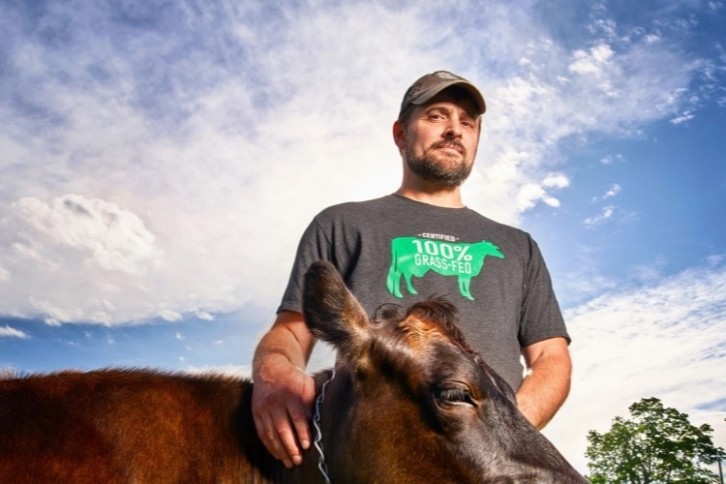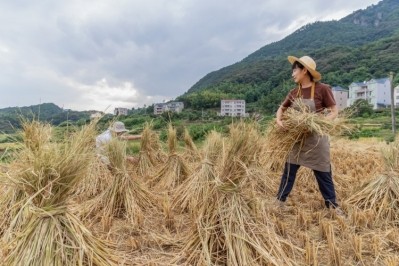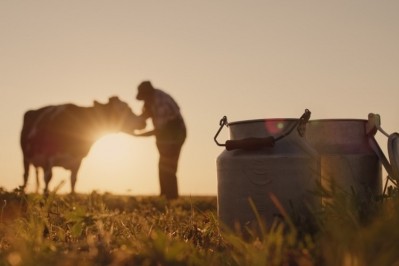‘Regenerative kind of came to us’: Maple Hill Creamery founder talks grass-fed organic dairy and being a pioneer in regenerative ag

Dubbed America’s original 100% grass-fed organic dairy company, Maple Hill Creamery remains the only US-based dairy producer to combine the three definitions today. Founder Tim Joseph himself isn’t what you’d call a conventional farmer, for reasons beyond the milk his dairy produces. “I had started to work for a friend in the oral surgery practise management world,” he said. “Then I was in digital imagery – when you get your X-rays, they put a little digital sensor in your mouth; I was a product manager for that for Kodak Dental at the time.” So what led him to dairy farming?
“We had a dream of a farm, so I literally drove all over upstate New York to find a suitable area. For the price of a house where we were living near the in the Hudson Valley, we bought a 250-acre farm with barns. We had two boys at the time and that eventually turned into five kids and we just wanted to raise them in that environment.”
Maple Hill Creamery started out as a conventional dairy producer, feeding cows grain with some seasonal grazing. But the higher paying price for organic milk convinced the team that a transition was viable. “We went organic because the conventional milk price was in one of these very low points. We were so close to managing organic that it didn't make any sense not to do that and get a higher price.
"But with the milk price for conventional being so low, it was a very bad time to transition, and then having to use organic inputs while getting paid such a low price made it even harder. That’s what forced us to take that next step and we went organic and grass-fed at the same time.”
While they had told them they couldn’t produce enough milk to survive on feeding cows ‘just grass’, Joseph said the benefits to herd health were plain to see from the get-go. “We were about a 60-cow herd and you'd have the vet come every month for a herd health visit - which was really more of a ‘herd sick’ visit because out of 50-60 cows, you always had five or six that had a chronic metabolic issue or a foot issue. Hoof and leg problems are the most common reason for a dairy cow to leave a herd. And that was probably the most impactful thing from a health standpoint. Our cows’ hooves became so hard – they were like rocks - from not feeding them corn silage anymore that the hoof trimmer just said, ‘you don't need me anymore.’ So going grass-fed eliminated a major problem that all dairy farmers generally face. And that was pretty powerful. Grazing is what cows were meant to do, really.”
Over the years, Maple Hill Creamery has grown from a single 65-head farm to 135 farms, each around 50-head – ‘pretty small in the grand scheme of dairy’, as Joseph said, but a model that’s proving to be resilient in terms of providing farmers price stability. “After we started to bring on more farms, I realized that grass-fed organic is hopefully a more stable market for what I would call family-scale farms,” he explained. “I'm not knocking larger farms - it's just that that's a different scale to most of modern dairy. And it's a lifestyle that so many people find important in rural America.
“But I think what's happened to organic, while it's still probably a better opportunity than conventional for small to mid-sized dairies in particular, organic has started to commoditize as well.
"We see larger and larger entrances and big, bigger and bigger farms all over the country. That may not meet the expectation of what an organic consumer thinks they're buying, but it is there. And it’s very difficult for a 50 or 100-cow dairy to compete against.”
At the same time, this type of ‘management-focused’ farming has attracted more young farmers into agriculture, Joseph claimed, and not just in dairy. “With a grass-fed farm, there's no day that's the same. It's hot, it's cold, it's wet, it's dry; the grass is growing or it's not. "It's really a thinking person's farm over and above everything, and that's not for everybody. It’s not that grain-fed farming isn't management-focused, but being able to feed a scoop of grain covers over a lot of sins, right?
He said that Maple Hill’s average farmer age is ‘probably still in the mid-40s, which relative to agriculture in general and dairy on top is 20-some years lower average age’.
‘My greatest fear is that we get a definition of regenerative that is pleasing and easy’
On top of being grass-fed and organic, Maple Hill is also adhering to regenerative farming practices. Back at the start, going regenerative was borne out of necessity, as Jospeh explained: “When we started doing this, regenerative wasn’t even a word yet. I always say Maple Hill farmers were regenerative before regenerative was a thing because in order to do this type of farming, you have to be regenerative.
“But we were kind of alone in it, and so we had a very bottoms-up grassroots culture and just figured it out – how to graze differently, how to manage these cows.
“If you want to produce grass-fed milk consistently for many years, you have to do it regeneratively – by constantly improving the land and the grass, by taking that solar energy and making the land and the cows work together so that you're leaving more nutrients in the soil than when you started.”
He calls that the flywheel. “For most Maple Hill farmers that join us, that act of regeneration takes anywhere from 3 to 5 years. From leaving the old system, utilizing the knowledge that we have now about how to graze and how to manage the cows, that regeneration starts and then eventually in year three to five, that flywheel is spinning. Your soil is able to hold more water, your grass becomes more sugar-rich, which helps the cows produce more milk.
“We didn't know we were doing that at the time, but we had to in order to survive. We couldn't afford to use those organic inputs, so regenerative kind of came to us.”
But as the debate about what constitutes regenerative rages on today more than ever, Joseph said he’s got a gripe about how undefined this type of farming remains. “Regenerative means 50 different things to 50 different people, and particularly in the business world.
“It does mildly annoy me that everybody's ‘regenerative’ when I know full well what that actually means. Regenerative by spreadsheet is not what we're doing. It's the real deal. And I hope that we figure out how to better communicate what that means so that it's more meaningful.”
Asked to elaborate, he said that a lot of what’s going on currently is ‘redefining what is already being done versus really making the big changes that need to happen for it to be the case.’ “At farmer level, to do regenerative, farmers put their livelihoods at risk,” he said.”
“It’s not fair to make a blanket statement, but I’ve been doing this long enough and I’ve seen enough to know in my heart of hearts that’s the case. Particularly in the plant-based movement. I just feel like there's a lot of greenwashing going on and there's a lot of consumers who think that they're buying a product that is better for them or better for the planet when to be really honest about it, plant-based agriculture is how we got here. That’s what crops are, right? What's different about taking this plant and grinding it up and putting it in a carton today that's different to yesterday?
“The regenerative-washing is a big problem and I really don’t know how to solve it. We're happy to say we're regenerative and that's the truth. Grass-fed, especially dairy and beef, it resonates with people, and maybe some of that is because of ‘regenerative’. But I am afraid that regenerative might go in a direction that is not congruent with how we do things and what we believe it to mean.”
The Maple Hill founder believes that creating an overly-prescriptive definition would be ‘the worst thing you can possibly do, because everybody’s context is so different’. “My greatest fear is that we get a definition of regenerative that is pleasing and easy for the entire industry to adopt, because then it will be completely meaningless if it isn't already,” he explained, adding that any definition should be tied to outputs.
Paying for progress
In April 2023, Maple Hill Creamery was awarded $20m in funding from USDA’s Partnerships for Climate-Smart Commodities program to grow markets for sustainable, regenerative grass-fed organic dairy. “The grant really intersected with so many things that we always wanted to do, but with our meagre resources as a small company, just couldn't,” Joseph said. “We’ve always wanted to incentivize our farmers for the positive outcomes that they create, but we didn’t have the funding – we pay one of the highest milk prices in the US, for one. We call it Pay for Progress and now we’ve been able to really put some fuel on the fire and get people incentivized to improve their pasture cover, which brings a whole range of other positives. The act of improving your pasture scores over time improves your financials forever.”
The grant will also enable the dairy to improve the visibility of its organic, grass-fed and regenerative credentials. Asked if he thinks whether consumers understood ‘regenerative’ Joseph said: “I don’t think most of them even know the word, and definitely don’t know what it means.
“We're all in this industry together and we talk about it all the time, but for the most part, my experience with consumers and a lot of research I've seen is it's still early days on the word ‘regenerative’. That’s the point behind the Climate-Smart grant – to create progress on the ground but also on the market. And maybe one day, people will start to understand what it means and gravitate towards those products.
“Our main focus is grass-fed and organic – it so happens that we are regenerative too, so that’s our consumer, and they are along for the ‘regenerative’ ride, whether they know it or not! We've been a pioneer there and I think consumers know we're special Maybe someday they’ll understand it’s because of the system that it's built upon and the fact that it's regenerative, but most of them are pretty happy to just be able to buy grass-fed. Grass-fed, it’s a powerhouse right now.”






